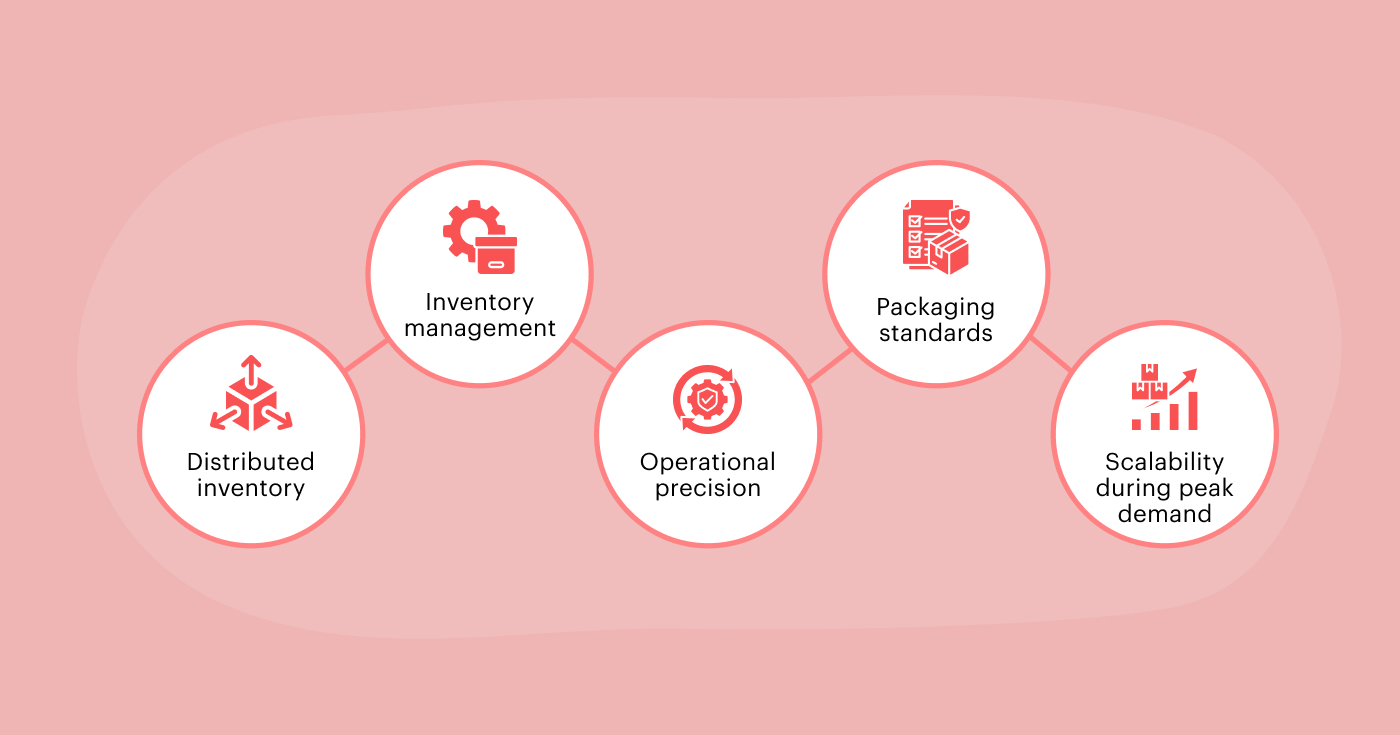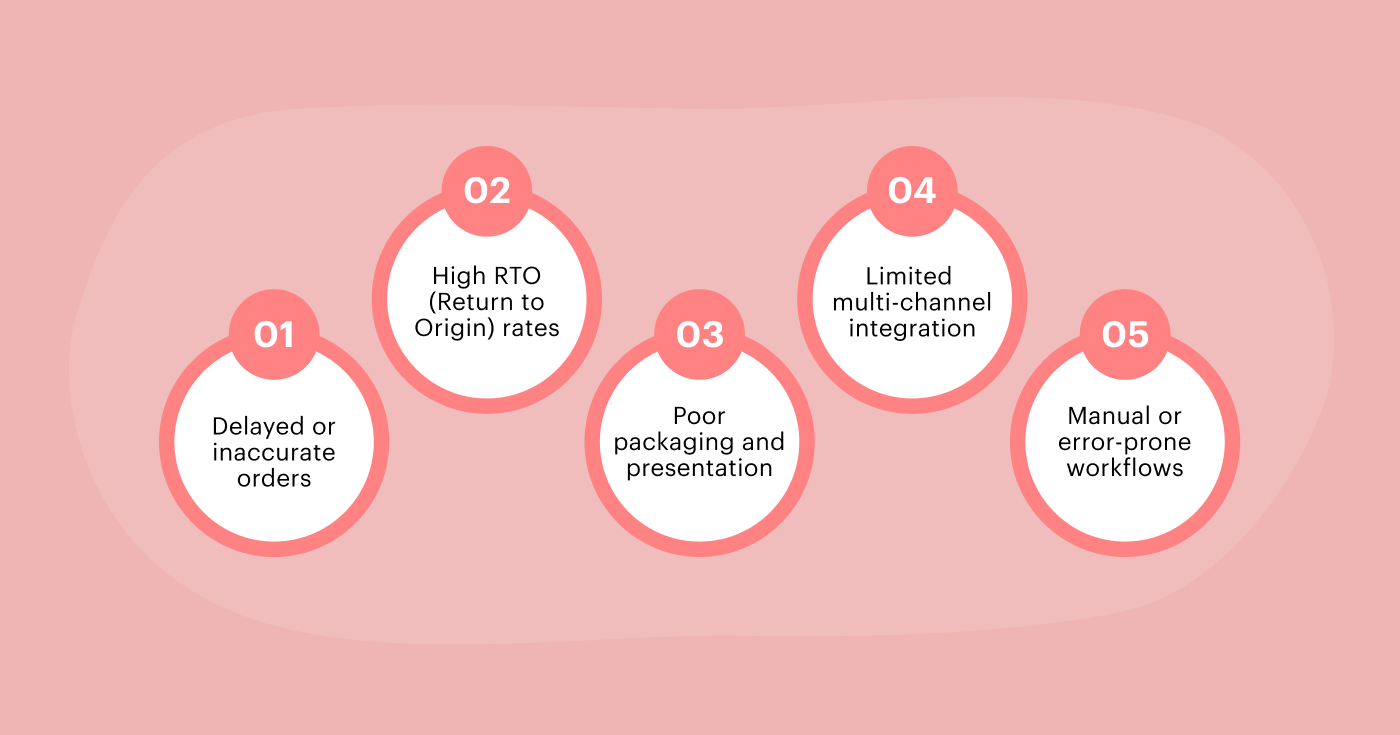
Get the latest from
Eshopbox

Ecommerce is growing faster than ever, but standing out in a crowded market is getting harder. Getting people to visit your online store is important — but turning that traffic into paying customers is where most brands struggle.
One of the most overlooked factors influencing this conversion gap is fulfilment speed and accuracy. Modern shoppers expect quick, reliable deliveries, and even minor delays can result in lost sales. In fact, Statista reports that over 54% of online shoppers abandon carts due to long or uncertain delivery timelines. Additionally, Speed Commerce notes that improving fulfilment performance can increase conversion rates by up to 30%.
With India’s ecommerce conversion rate averaging just 2.4%, even small operational enhancements can drive significant growth. For brands selling on marketplaces, being fulfilment-ready has become a critical differentiator — enabling faster deliveries, reducing cancellations, and improving product visibility.
Why is fulfilment a critical driver of sales conversions?
Ecommerce conversion is not determined solely at the checkout page. Research consistently shows that shipping and fulfilment are crucial factors influencing purchase decisions:
- 69% of shoppers abandon carts due to high shipping costs
- 63% of consumers expect standard delivery within three days
- Fast and accurate shipping drives repeat purchases and positive reviews
Shoppers have numerous alternatives. If a brand cannot provide timely deliveries or accurate tracking, consumers will switch to competitors, even if product quality is similar.
Fulfilment is now a strategic customer touchpoint. Brands optimizing their warehouse, inventory, and shipping processes see measurable improvements in conversion rates, marketplace ranking, and revenue.
A reliable logistics fulfilment company ensures operational efficiency, improves customer satisfaction, and enables brands to focus on growth.
What are the core components of marketplace-ready fulfilment?

Marketplace success depends on more than just fulfilment — it requires precision and agility. Platforms like Amazon, Flipkart, and Myntra set high standards for speed, compliance, and visibility. Here are the key elements of a marketplace-ready fulfilment:
1. Distributed inventory
Storing inventory in third-party warehouse services across India reduces delivery times, lowers costs, and ensures faster shipping. Localized inventory supports next-day or two-day delivery in major cities and improves marketplace rankings.
2. Integrated order and inventory management
Real-time inventory synchronization prevents overselling, ensures accurate stock visibility, and minimizes cancellations. This is essential for the best delivery partner in India.
3. Automation and operational precision
Automated picking, packing, and quality checks reduce errors. Advanced workflows, barcode scanning, and automated kitting ensure complex and high-volume orders are processed accurately.
4. Compliance and packaging standards
Marketplace-specific packaging, safety regulations, and presentation standards strengthen brand trust and improve customer experience.
5. Scalability during peak demand
Festive seasons, product launches, or influencer campaigns require fulfilment operations that scale without compromising speed or quality.
Brands mastering these elements gain a competitive edge, increasing conversions while maintaining operational efficiency.
What fulfilment challenges affect sales conversions?

Even premium products can underperform if fulfilment is inefficient. Key challenges include:
1. Delayed or inaccurate orders
Late deliveries, partial shipments, or incorrect items erode customer trust. Customers are likely to abandon brands that consistently fail to deliver on time. In marketplaces, a single SLA breach can lower seller ratings, reducing visibility and impacting future sales.
2. High RTO (Return to Origin) rates
Failed deliveries, stockouts, or damaged goods increase return rates and operational costs. Higher RTOs not only reduce profitability but also affect warehouse efficiency and brand credibility.
3. Poor packaging and presentation
Inconsistent or inadequate packaging affects product safety and the customer’s unboxing experience. Marketplace shoppers are influenced by presentation quality, and poor packaging can lead to negative reviews or loss of repeat buyers.
4. Limited multi-channel integration
Brands often struggle to manage inventory across DTC platforms, marketplaces, and wholesale channels. This can lead to overselling, missed orders, or inventory mismatches, which directly impacts sales and customer experience.
5. Manual or error-prone workflows
Manual picking, packing, and order processing increase the risk of mistakes and slow down fulfilment. Without automation, high-volume operations cannot maintain speed or accuracy, affecting customer satisfaction and repeat purchases.
By addressing these pain points, brands can improve conversion rates, operational efficiency, and customer loyalty. Partnering with a best delivery partner for ecommerce or online shipping service that leverages technology is essential to overcome these challenges.
How does Eshopbox enable brands to scale through marketplace-ready fulfilment?

Eshopbox provides technology-driven, pan-India fulfilment solutions designed to help brands meet marketplace requirements, reduce cancellations, and scale efficiently. Key capabilities include:
1. PAN India warehouse network
Inventory is stored across multiple fulfilment centers in India, enabling faster delivery and zonal shipping. Localized stock reduces shipping costs, ensures higher regional in-stock levels, and improves delivery timelines—directly boosting customer satisfaction. This approach allows brands to reach more customers faster and maintain a competitive edge in the market.
2. Automated order and inventory management
Real-time inventory syncing across marketplaces prevents overselling and ensures stock levels are accurate. Automated order processing reduces human errors, ensuring that customers receive the right products on time, every time. Brands can also monitor inventory trends and avoid stockouts during peak demand periods.
3. Operational automation
Eshopbox leverages automation across picking, packing, kitting, bundling, and B2B orders. Barcode-enabled workflows maintain accuracy even during peak seasons, helping brands scale without adding manual labor. This reduces operational bottlenecks and accelerates fulfilment cycles for faster delivery.
4. Compliance and packaging standards
Marketplace-specific packaging and labeling rules are followed while maintaining brand-consistent unboxing experiences. Reliable packaging reduces damage, builds trust, and encourages repeat purchases. Adhering to compliance ensures smoother marketplace approvals and fewer order rejections.
5. Predictive logistics and RTO reduction
Smart courier allocation, predictive route optimization, and automated handling of non-delivery reports reduce failed deliveries and RTOs. Brands can retain more revenue and maintain high marketplace performance ratings. This proactive approach helps prevent delivery issues before they impact the customer experience.
6. Data-driven insights and scalability
Unified dashboards provide visibility into inventory, fulfilment, returns, and delivery performance. Brands can forecast demand, optimize warehouse usage, and scale operations efficiently during festive seasons, product launches, or flash sales. These insights empower brands to make informed operational decisions that improve both efficiency and customer satisfaction.
By providing these solutions, Eshopbox transforms fulfilment from a back-end function into a strategic growth lever, empowering brands to improve conversion rates, customer satisfaction, and operational efficiency.
How has Eshopbox helped Pidilite achieve marketplace excellence?
For Pidilite, Eshopbox became a critical partner in achieving marketplace-ready fulfilment and scaling sales efficiently. With Eshopbox solutions, Pidilite streamlined operations, improved delivery performance, and enhanced customer experience.
Impacts for Pidilite include:
- 100% listings optimized for express fulfilment
- Faster delivery and higher marketplace conversion rates
- Reduced cancellations and order returns
- Improved regional stock availability and utilization
- Compliance with marketplace packaging and SLA requirements
- Increased customer satisfaction and repeat purchases
These results highlight how marketplace-ready fulfilment directly drives conversions, boosts operational efficiency, and strengthens brand trust.
We hit three goals simultaneously—increasing our AOV, reducing shipping costs and improving profitability. Our goals now seem achievable, and we aim to achieve 3X growth by expanding to new sales channels with Eshopbox.
— Aniruddha Dutt, Head of Ecommerce, Pidilite
Conclusion
In India’s competitive ecommerce market, fulfilment is no longer a back-end function—it is a strategic driver of conversions, revenue, and customer loyalty. Brands that leverage third party warehouse services, best delivery partner for ecommerce, and online shipping solutions can ensure faster deliveries, lower RTOs, and better marketplace performance.
Partnering with Eshopbox enables brands to transform fulfilment into a growth engine, providing automation, predictive insights, and operational scalability. For brands like Pidilite, marketplace-ready fulfilment has led to faster order processing, reduced cancellations, and higher conversion rates—demonstrating the tangible impact of efficient fulfilment on business growth.
The question is no longer whether brands can afford optimized fulfilment — it’s whether they can afford not to. Every accurate, timely delivery strengthens your brand, boosts revenue, and enhances customer loyalty.
Connect with our fulfilment expert today.
Talk to salesRelated Articles
Top 10 popular D2C apparel brands in India in 2026
The 2026 ultimate guide to D2C fulfilment in India
How Eshopbox Helps Brands Deliver Faster with a Pan-India Warehouse Network?













